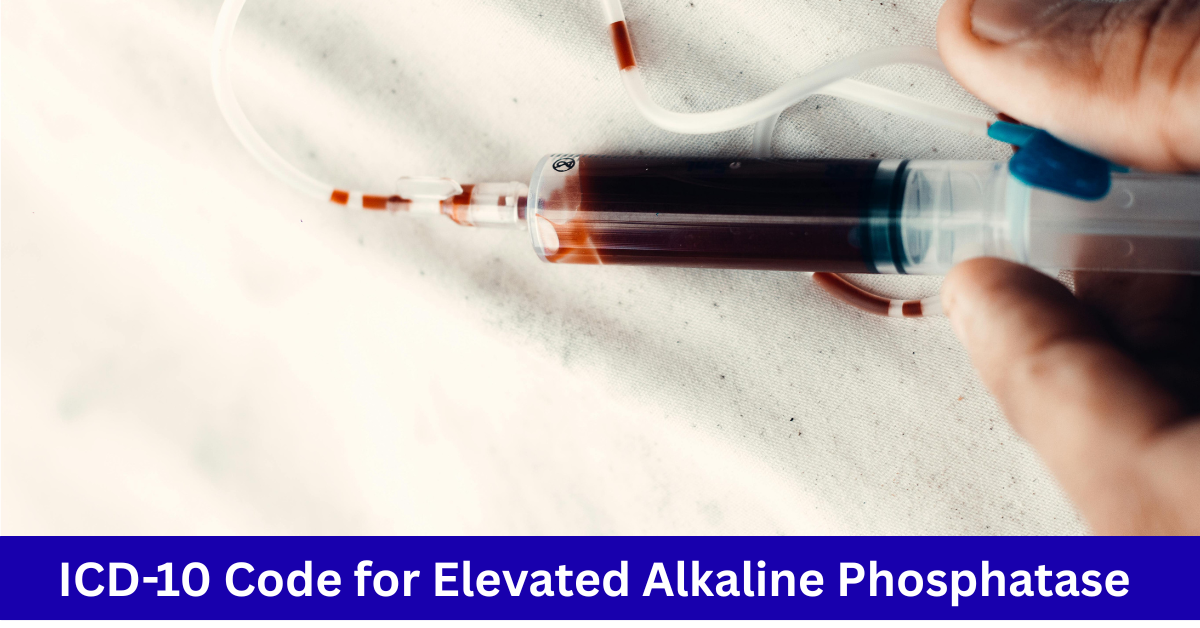
What Is the ICD-10 Code for Elevated Alkaline Phosphatase?
The ICD-10 code for elevated alkaline phosphatase is R74.8, which represents abnormal levels of other serum enzymes. Doctors use this code when ALP levels rise above the normal range but the exact cause remains unclear. Once they identify the underlying condition, they may apply a more specific ICD-10 code.
Understanding Elevated Alkaline Phosphatase
Alkaline phosphatase (ALP) is an enzyme found in the liver, bones, kidneys, and digestive tract. When levels increase, it often signals liver or bone conditions, but it can also appear during normal growth or pregnancy. Therefore, the test result serves as an important clue rather than a final diagnosis.
Because lab results guide further testing, accurate coding allows healthcare providers, patients, and insurers to stay aligned. The code R74.8 ensures medical records clearly reflect the abnormal enzyme finding while doctors continue their investigation.
Why Accurate Coding Matters
Correct coding supports both patient care and healthcare administration. Here is why it matters:
-
Improves communication: Doctors and specialists can track enzyme abnormalities with precision.
-
Supports insurance approval: Claims process smoothly when the correct ICD-10 code appears on records.
-
Helps research and statistics: Public health studies rely on accurate data to understand disease patterns.
By using R74.8 correctly, healthcare professionals reduce errors and maintain consistency in medical records.
Causes of Elevated Alkaline Phosphatase
ALP levels can rise for several reasons, and knowing them helps doctors choose additional tests. Common causes include:
-
Liver disorders such as hepatitis, cirrhosis, or bile duct obstruction.
-
Bone conditions like Paget’s disease, osteomalacia, or bone healing after fractures.
-
Physiological changes including pregnancy or growth in children.
-
Other health issues such as thyroid disorders, certain cancers, or medication effects.
Because the cause determines treatment, doctors always interpret the lab result alongside a patient’s history and symptoms.
Related ICD-10 Codes
Doctors may use different ICD-10 codes depending on which enzyme shows abnormal levels. Here is a reference table:
| Condition / Abnormal Lab Finding | ICD-10 Code |
|---|---|
| Elevated alkaline phosphatase | R74.8 |
| Elevated transaminases (AST/ALT) | R74.01 |
| Elevated LDH (lactate dehydrogenase) | R74.0 |
| Elevated gamma-glutamyl transferase (GGT) | R74.8 |
| Abnormal liver function test (unspecified) | R94.5 |
This table highlights how coding separates different enzyme abnormalities, which makes medical documentation more precise.
Clinical Importance
Doctors use the ICD-10 code R74.8 as a temporary marker. For example, when a patient presents with abnormal ALP, the code documents the lab result while further testing continues. If gallstones turn out to be the cause, the record may later show K80.2 for gallstones instead.
In children, doctors may use the code when ALP rises during growth spurts, but they usually confirm it as a harmless change. Therefore, the code acts as a bridge between raw lab data and final diagnosis.
Patient Perspective
For patients, seeing “elevated alkaline phosphatase” on a lab report often feels confusing. However, the result does not always mean serious disease. In many cases, doctors request repeat tests or imaging studies to understand the reason. Sometimes the elevation relates to normal life stages, such as adolescence or pregnancy.
The key takeaway is that the code R74.8 indicates a laboratory clue, not a permanent diagnosis. Patients should always discuss their results with their doctor instead of assuming the worst.
FAQs
What is the ICD-10 code for elevated alkaline phosphatase?
The ICD-10 code is R74.8, which classifies abnormal serum enzyme levels, including ALP.
What conditions cause elevated alkaline phosphatase?
Liver disorders, bone diseases, pregnancy, certain cancers, and some medications can increase ALP.
Does elevated ALP always mean disease?
No. Sometimes the rise occurs in normal situations like growth or pregnancy, but persistent elevation should be evaluated.
Can doctors use more than one code for ALP elevation?
Yes. If the cause becomes clear, doctors may add or replace R74.8 with a more specific disease code.
How do doctors confirm the reason for elevated ALP?
They order further tests such as imaging, liver function tests, or bone scans to find the cause.
Conclusion
The ICD-10 code for elevated alkaline phosphatase (R74.8) plays a vital role in healthcare. It allows doctors to document abnormal enzyme levels accurately while they search for the cause. For patients, it simply highlights that further testing is necessary, not that a serious condition already exists.
By using this code correctly, healthcare providers improve communication, support insurance claims, and strengthen medical records. Patients, on the other hand, gain clarity and reassurance about what their lab results actually mean.